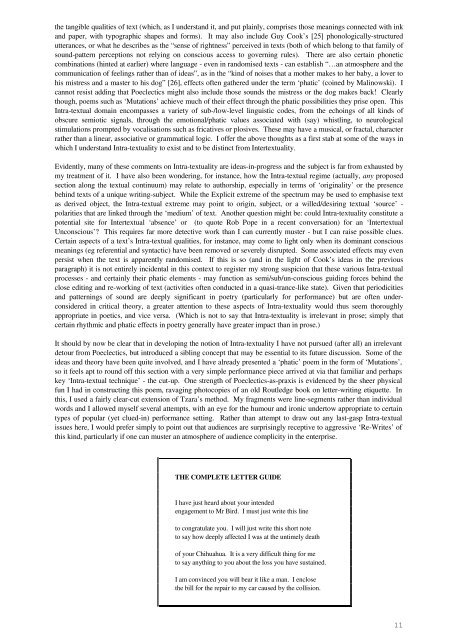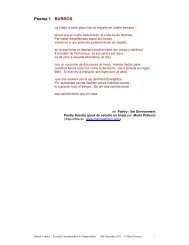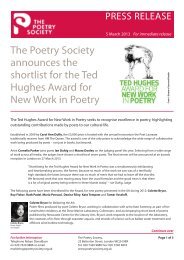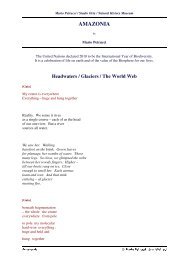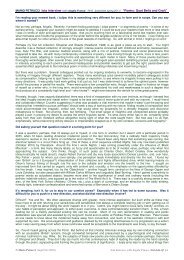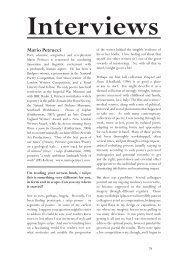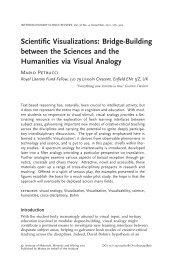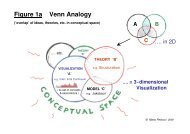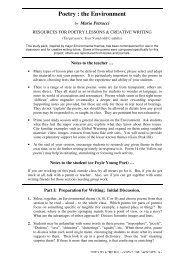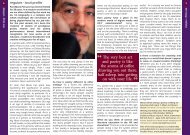poetry in performance: intertextuality, intra-textuality ... - Mario Petrucci
poetry in performance: intertextuality, intra-textuality ... - Mario Petrucci
poetry in performance: intertextuality, intra-textuality ... - Mario Petrucci
You also want an ePaper? Increase the reach of your titles
YUMPU automatically turns print PDFs into web optimized ePapers that Google loves.
the tangible qualities of text (which, as I understand it, and put pla<strong>in</strong>ly, comprises those mean<strong>in</strong>gs connected with <strong>in</strong>k<br />
and paper, with typographic shapes and forms). It may also <strong>in</strong>clude Guy Cook’s [25] phonologically-structured<br />
utterances, or what he describes as the “sense of rightness” perceived <strong>in</strong> texts (both of which belong to that family of<br />
sound-pattern perceptions not rely<strong>in</strong>g on conscious access to govern<strong>in</strong>g rules). There are also certa<strong>in</strong> phonetic<br />
comb<strong>in</strong>ations (h<strong>in</strong>ted at earlier) where language - even <strong>in</strong> randomised texts - can establish “…an atmosphere and the<br />
communication of feel<strong>in</strong>gs rather than of ideas”, as <strong>in</strong> the “k<strong>in</strong>d of noises that a mother makes to her baby, a lover to<br />
his mistress and a master to his dog” [26], effects often gathered under the term ‘phatic’ (co<strong>in</strong>ed by Mal<strong>in</strong>owski). I<br />
cannot resist add<strong>in</strong>g that Poeclectics might also <strong>in</strong>clude those sounds the mistress or the dog makes back! Clearly<br />
though, poems such as ‘Mutations’ achieve much of their effect through the phatic possibilities they prise open. This<br />
Intra-textual doma<strong>in</strong> encompasses a variety of sub-/low-level l<strong>in</strong>guistic codes, from the echo<strong>in</strong>gs of all k<strong>in</strong>ds of<br />
obscure semiotic signals, through the emotional/phatic values associated with (say) whistl<strong>in</strong>g, to neurological<br />
stimulations prompted by vocalisations such as fricatives or plosives. These may have a musical, or fractal, character<br />
rather than a l<strong>in</strong>ear, associative or grammatical logic. I offer the above thoughts as a first stab at some of the ways <strong>in</strong><br />
which I understand Intra-<strong>textuality</strong> to exist and to be dist<strong>in</strong>ct from Inter<strong>textuality</strong>.<br />
Evidently, many of these comments on Intra-<strong>textuality</strong> are ideas-<strong>in</strong>-progress and the subject is far from exhausted by<br />
my treatment of it. I have also been wonder<strong>in</strong>g, for <strong>in</strong>stance, how the Intra-textual regime (actually, any proposed<br />
section along the textual cont<strong>in</strong>uum) may relate to authorship, especially <strong>in</strong> terms of ‘orig<strong>in</strong>ality’ or the presence<br />
beh<strong>in</strong>d texts of a unique writ<strong>in</strong>g-subject. While the Explicit extreme of the spectrum may be used to emphasise text<br />
as derived object, the Intra-textual extreme may po<strong>in</strong>t to orig<strong>in</strong>, subject, or a willed/desir<strong>in</strong>g textual ‘source’ -<br />
polarities that are l<strong>in</strong>ked through the ‘medium’ of text. Another question might be: could Intra-<strong>textuality</strong> constitute a<br />
potential site for Intertextual ‘absence’ or (to quote Rob Pope <strong>in</strong> a recent conversation) for an ‘Intertextual<br />
Unconscious’? This requires far more detective work than I can currently muster - but I can raise possible clues.<br />
Certa<strong>in</strong> aspects of a text’s Intra-textual qualities, for <strong>in</strong>stance, may come to light only when its dom<strong>in</strong>ant conscious<br />
mean<strong>in</strong>gs (eg referential and syntactic) have been removed or severely disrupted. Some associated effects may even<br />
persist when the text is apparently randomised. If this is so (and <strong>in</strong> the light of Cook’s ideas <strong>in</strong> the previous<br />
paragraph) it is not entirely <strong>in</strong>cidental <strong>in</strong> this context to register my strong suspicion that these various Intra-textual<br />
processes - and certa<strong>in</strong>ly their phatic elements - may function as semi/sub/un-conscious guid<strong>in</strong>g forces beh<strong>in</strong>d the<br />
close edit<strong>in</strong>g and re-work<strong>in</strong>g of text (activities often conducted <strong>in</strong> a quasi-trance-like state). Given that periodicities<br />
and pattern<strong>in</strong>gs of sound are deeply significant <strong>in</strong> <strong>poetry</strong> (particularly for <strong>performance</strong>) but are often underconsidered<br />
<strong>in</strong> critical theory, a greater attention to these aspects of Intra-<strong>textuality</strong> would thus seem thoroughly<br />
appropriate <strong>in</strong> poetics, and vice versa. (Which is not to say that Intra-<strong>textuality</strong> is irrelevant <strong>in</strong> prose; simply that<br />
certa<strong>in</strong> rhythmic and phatic effects <strong>in</strong> <strong>poetry</strong> generally have greater impact than <strong>in</strong> prose.)<br />
It should by now be clear that <strong>in</strong> develop<strong>in</strong>g the notion of Intra-<strong>textuality</strong> I have not pursued (after all) an irrelevant<br />
detour from Poeclectics, but <strong>in</strong>troduced a sibl<strong>in</strong>g concept that may be essential to its future discussion. Some of the<br />
ideas and theory have been quite <strong>in</strong>volved, and I have already presented a ‘phatic’ poem <strong>in</strong> the form of ‘Mutations’,<br />
so it feels apt to round off this section with a very simple <strong>performance</strong> piece arrived at via that familiar and perhaps<br />
key ‘Intra-textual technique’ - the cut-up. One strength of Poeclectics-as-praxis is evidenced by the sheer physical<br />
fun I had <strong>in</strong> construct<strong>in</strong>g this poem, ravag<strong>in</strong>g photocopies of an old Routledge book on letter-writ<strong>in</strong>g etiquette. In<br />
this, I used a fairly clear-cut extension of Tzara’s method. My fragments were l<strong>in</strong>e-segments rather than <strong>in</strong>dividual<br />
words and I allowed myself several attempts, with an eye for the humour and ironic undertow appropriate to certa<strong>in</strong><br />
types of popular (yet clued-<strong>in</strong>) <strong>performance</strong> sett<strong>in</strong>g. Rather than attempt to draw out any last-gasp Intra-textual<br />
issues here, I would prefer simply to po<strong>in</strong>t out that audiences are surpris<strong>in</strong>gly receptive to aggressive ‘Re-Writes’ of<br />
this k<strong>in</strong>d, particularly if one can muster an atmosphere of audience complicity <strong>in</strong> the enterprise.<br />
THE COMPLETE LETTER GUIDE<br />
I have just heard about your <strong>in</strong>tended<br />
engagement to Mr Bird. I must just write this l<strong>in</strong>e<br />
to congratulate you. I will just write this short note<br />
to say how deeply affected I was at the untimely death<br />
of your Chihuahua. It is a very difficult th<strong>in</strong>g for me<br />
to say anyth<strong>in</strong>g to you about the loss you have susta<strong>in</strong>ed.<br />
I am conv<strong>in</strong>ced you will bear it like a man. I enclose<br />
the bill for the repair to my car caused by the collision.<br />
11


